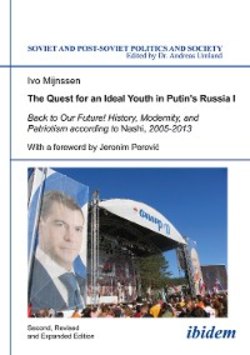Читать книгу The Quest for an Ideal Youth in Putin's Russia I - Ivo Mijnssen - Страница 4
Preface
ОглавлениеMy interest in Nashi began with the organization’s first demonstration in 2005: the fact that a youth organization had used the commemoration of the Great Patriotic War to mobilize young Russians was very surprising to my Western European mind. Young people in Switzerland are more soporific than energetic when discussions or lessons in school turn to historical issues.
In Russia, however, war memory is held sacred by a vast majority of the population and continues to serve an important societal and political function. That a state-sponsored youth movement would use this memory as the basis of its identity is thus less surprising than it first seemed. The goal of this book is to show the role that war memory played for Nashi and its link to various aspects of the movement’s identity concepts and ideology.
I developed Back to Our Future out of a Masters thesis at the University of Basel, submitted in 2010. Since then, I have revised and translated the book, added a chapter and new materials. I did research for this book in St. Petersburg, Moscow, at Lake Seliger, at Stanford University, in Zürich, Bern and Basel.
After finishing the book in August 2012, the opportunity arose to publish a second, revised and extended edition of the book in late 2013. The new edition includes current developments, some minor corrections and an improved index at the end. By covering Nashi’s development from 2005-2013, the book now contains the organization’s entire history, as it was disbanded in early 2013. Other state-sponsored youth organizations have taken Nashi’s place, and new ones will undoubtedly be founded when the need arises to demonstrate unity and youth support for the Putin regime. It is my hope that this book – in conjunction with the parallel volume written by my colleague Jussi Lassila – will also continue to contribute to a better understanding of youth politics in Russia in the future.
I first want to thank my Russian friends and colleagues who have helped me understand Russian politics better. Danila Korogodskii hosted me in St. Petersburg and provided me with an astute and critical view on his country. Alla Lapidus guided me through the challenges of working in the Russian National Library, and Sergei Simonov, editor of politgramota.ru, took a lot of time to explain the intricacies of Russia’s youth politics to me. I want to thank the two Nashi commissars, who spoke to me so openly, for their valuable insights into the organizations inner workings. This book would have been much less rich without my participation in the «International Youth Forum Seliger 2010». In spite of all its problematic aspects, I want to thank the organizers of the forum for inviting international students to the beautiful shores of Seliger. It was, however, the Russian volunteers who acted as unpaid mediators and translators between internationals and Russians who deserve the highest praise. I am particularly grateful to Dima, Masha and Polina.
I did a lot of work on this book during my year as a Visiting Scholar at the Center for Russian, East European and Eurasian Studies at Stanford University (CREEES). I am grateful to Professor Emeritus Abbott Gleason and Professor Norman Naimark for making this year possible, and to Rob Wessling, Bob Crews, Karen Haley and Van-Anh Nguyen for the continued support at the Center.
The graduate students at CREEES and in Russian and Eastern European History made sure I felt welcome on campus. I want to thank Markian Dobczansky and Dan Heller for reading drafts of chapters. Jussi Lassila read the entire manuscript and gave me very useful feedback. Anna Whittington did a tremendous job editing the book «European style» and making sure my German did not get in the way of readable English prose. I am also grateful for series editor Andreas Umland’s formatting work.
This project began and ended in Switzerland. Professor Emeritus Heiko Haumann was a great first reader of my MA-thesis, and Professor Jeronim Perovic deserves thanks for being a second reader and writing the foreword. Last but not least, Dr. Philipp Casula has for the past five years been a wonderful colleague and critic of my work.
At different times, this work absorbed me heavily. I therefore want to thank my family. My parents Daniela and Pete read early drafts of the thesis, and my brother Remo was an amazing study partner during the summer of 2009. My wife Jessy, finally, not only read multiple drafts of the English manuscript but also made sure I could focus on my work and not get too absorbed by it. Without her, life would be much less fun.
Ivo Mijnssen
Zürich, January 2014
